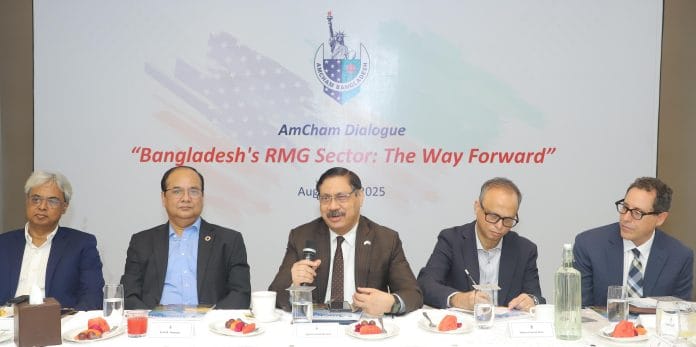Energy shortages, market concentration risks, and fragile factory conditions are placing Bangladesh’s ready-made garment (RMG) sector under mounting pressure, industry leaders warned at a high-level policy dialogue organized by the American Chamber of Commerce in Bangladesh (AmCham) on Wednesday.
Held at the Sheraton Dhaka, the breakfast meeting — titled “Bangladesh’s RMG Sector: The Way Forward” — brought together senior representatives from the government, private sector, and international development partners to chart a sustainable future for the country’s largest export industry.
In a stark assessment of the sector’s challenges, Bangladesh Garment Manufacturers and Exporters Association (BGMEA) President Mahmud Hasan Khan highlighted ongoing disruptions in energy supply, particularly the gas shortage, which is severely affecting backward linkage industries. He noted that with only two Floating Storage and Regasification Units (FSRUs) operational, urgent infrastructure development is needed to stabilize energy access.
Khan also criticized the abrupt cancellation of 54 Letters of Intent (LOIs), warning that such unpredictability risks undermining investor confidence. While acknowledging progress in solar energy — particularly through the Merchant Power Purchase Agreement — he cited land scarcity as a key constraint to scaling renewable solutions.
“The industry is at a critical juncture,” said Khan, noting that fewer than 3,000 of BGMEA’s 7,100 members are actively exporting. He emphasized that BGMEA is intensifying its efforts to support mid- and low-tier factories, aiming to bolster operational efficiency and resilience across the sector.
AmCham President Syed Ershad Ahmed delivered the keynote address, urging diversification of both export destinations and product offerings. He highlighted the country’s heavy dependence on the RMG sector, which accounts for 81.5% of total exports and contributes 11% to GDP.
“Our over-reliance on a few markets makes us extremely vulnerable,” Ahmed said, pointing out that 40% of RMG exports go to the European Union and 17.6% to the United States — a level of dependence surpassing even that of India or Vietnam. Citing data from the Asian Development Bank and World Bank, he warned that a rise in US tariffs could reduce Bangladesh’s GDP growth by up to 2 percentage points.
Further, a 1% increase in global tariffs could cut global trade volumes by a similar margin, making urgent reforms and market diversification essential, he said.
Also speaking at the event, Bangladesh Competition Commission Chairman A.H.M. Ahsan called for vertical diversification within the RMG sector. “We must move from low-value to high-value production,” he urged, especially as Bangladesh prepares to graduate from its Least Developed Country (LDC) status.
Md. Anwar Hossain, Vice Chairman of the Export Promotion Bureau (EPB), announced several proposed reforms including a bond facility backed by bank guarantees to allow partial exporters duty-free imports. He also unveiled the establishment of a new “$100 Billion RMG Export Cell” to coordinate policy across energy, finance, and taxation with key industry associations.
“With coordinated efforts, we can reach $100 billion in RMG exports by 2027–2028,” Hossain said.
Other distinguished speakers included Mr. Faisal Samad, Director of BGMEA; Mr. Gazi AKM Fazlul Haque, Director General (Investment Ecosystem), Bangladesh Investment Development Authority (BIDA); Mr. Mohammad Naziur Rahman Miah, First Secretary (Customs: Export & Bond), National Board of Revenue; Mr. Paul Frost, Commercial Counselor, US Embassy; and Ms. Leena Khan, Labor Attaché, US Embassy.
AmCham Treasurer Al-Mamun M Rashel, along with economists, academics, and other RMG sector representatives also participated in the dialogue, which underscored the need for coordinated policy, innovation, and long-term vision to sustain Bangladesh’s economic momentum.

